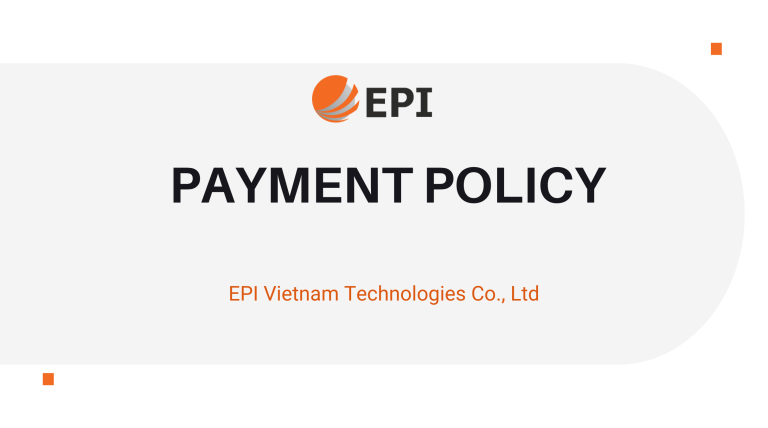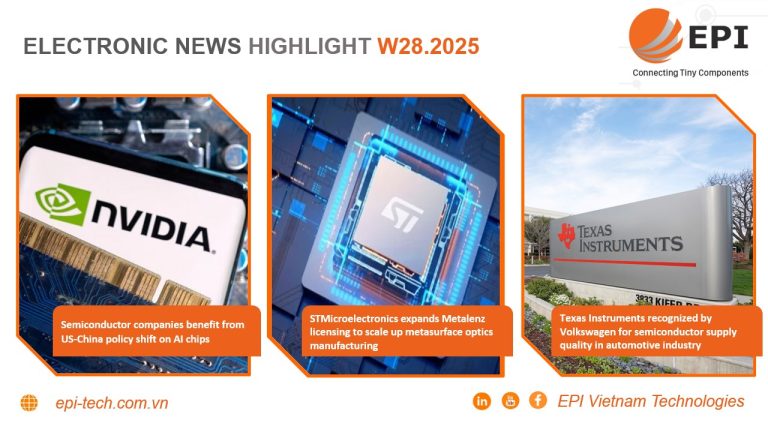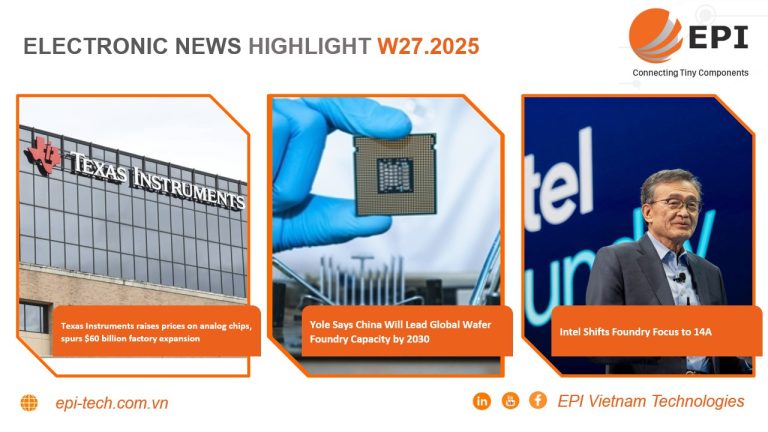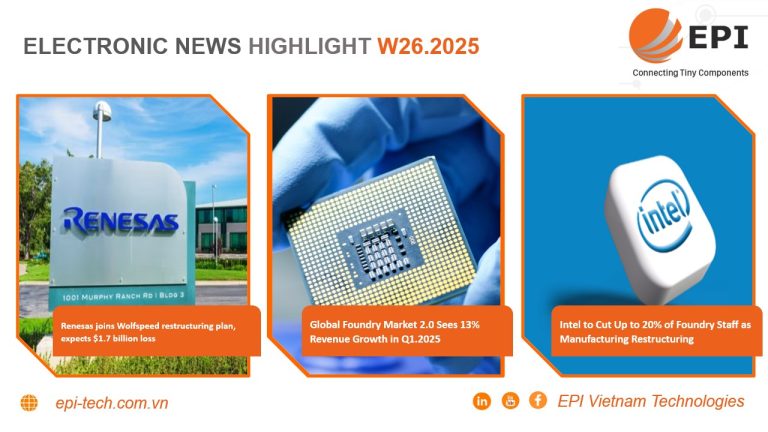ELECTRONICS NEWS HIGHLIGHTS W25.2023
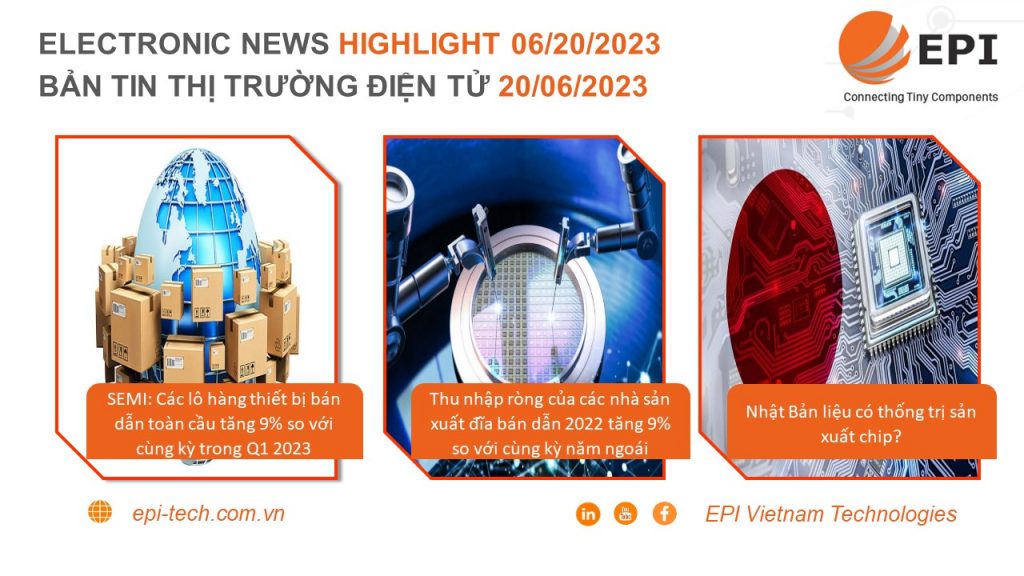
1. SEMI: GLOBAL SEMICONDUCTOR EQUIPMENT SHIPMENTS UP 9% YOY IN Q1 2023
According to SEMI’s latest report, global semiconductor equipment sales in the first quarter of 2023 increased by 9% year-on-year to US$26.8 billion, but fell by 3% quarter-on-quarter.
“Semiconductor equipment revenue in the first quarter was robust despite macroeconomic headwinds and a challenging industry environment,” said Ajit Manocha, SEMI president and CEO.
Details: GLOBAL SEMICONDUCTOR EQUIPMENT SHIPMENTS UP 9% YOY IN Q1 2023
2. WAFER EQUIPMENT MANUFACTURERS’ NET INCOME IN 2022 INCREASED BY 9% YEAR-ON-YEAR
According to the latest report from Counterpoint, the net income of global semiconductor wafer fab equipment (WFE) manufacturers increased to $120 billion in 2022, a year-on-year increase of 9%, setting a new record.
The report indicates that the semiconductor industry has increased investment in the IoT, AI, 5G, automotive,… markets, which has helped the system and service revenue of the top 5 device manufacturers, Applied Materials, ASML, Tokyo Electron, Lam Research and KLA Corporation grew to $95 billion.
The report pointed out that after three consecutive years of growth in the fab equipment market, the net revenue in 2023 is estimated to be $108.45 billion, a year-on-year decrease of 10%. Counterpoint commented that due to the impact of currency fluctuations, especially the depreciation of the yen and sales denominated in euros, the size of the fab equipment market in US dollars will shrink by more than 8% in 2022. As these new technologies transition to volume manufacturing, increased R&D spending in 2022 will allow the fab equipment market to overtake the semiconductor market in the long run.
Details: WAFER EQUIPMENT MANUFACTURERS’ NET INCOME IN 2022 INCREASED BY 9% YEAR-ON-YEAR
3. COULD JAPAN DOMINATE CHIP PRODUCTION?
Japan is currently investing significantly in research and development of chip manufacturing. With a background of a country with a thriving semiconductor industry, with long-standing companies such as Renesas Electronics, Sony and Toshiba. Along with that is the support of the Japanese government in policies to encourage innovation, tax incentives, research funding and reasonable regulation, attracting investment and talent. Promising the development of the Rising Sun Kingdom in the chip manufacturing industry.
In May, the leaders of the G7 met in Hiroshima, Japan, to discuss global challenges. In terms of global supply chains, semiconductor chip development and access is essential for the global industry and digital economy to thrive. America, and Europe, and China all depend on them.
In response to the geopolitical situation, Japan has increased investment in semiconductor production, research and development. Increased funding will allow the country to accelerate the development of innovative technologies, enhancing its competitiveness in the global arena.
Given its history of technological innovation, Japan has the potential to capitalize on the void left by Taiwan’s absence in the semiconductor market. The country has a thriving semiconductor industry, with established companies such as Renesas Electronics, Sony and Toshiba. Japan’s expertise in precision manufacturing, materials science and chip design makes it a strong contender to take over the semiconductor manufacturing sector.
Japan will need significant investment in research and development. The country has a track record of investing in cutting-edge technologies, and this approach will be critical to developing advanced chip manufacturing processes. Japan’s focus on R&D will lead to breakthroughs in nanotechnology, advanced lithography and materials science, ensuring Japan’s competitiveness in the global semiconductor market.
The support of the Japanese government is very important. Policies that encourage innovation, such as tax incentives, research funding and sound regulation, will attract investment and talent. Japan’s existing technological expertise, infrastructure and investment potential, coupled with international cooperation and supply chain diversification, could pave the way for the country’s rise as an investment capital. way is the king of chip manufacturing.
#electronicsnews
#tintucthitruongdientu
#chipshortage
#semiconductorshortage



 English
English  Tiếng Việt
Tiếng Việt 







